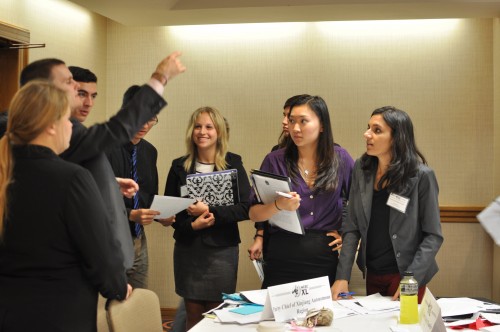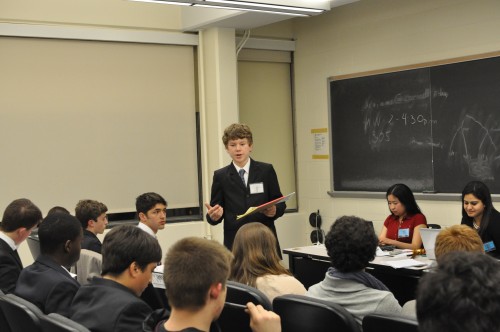MUN delegates often spend weeks preparing for a conference; staying up until 2 am to find alternative solutions and annotating your background guide until every other line is covered with highlighter. While understanding your topic and country’s policy is the one part of success at a MUN conference, the hardest part of a conference is the actual committee itself. Preparation can only take you so far, rather it is being an adaptable delegate that will win you a gavel. It can be hard to read about how to be adaptable, but it is possible to train yourself in this. Here are training activities that can help delegates on their feet in committee.

Delegates caucus in the Special Meeting of the Chinese Politburo 2017
1. The Fishbowl Technique
To prepare for stressful conversations during unmoderated caucuses, my team uses the Fishbowl Technique. Depending on the size of your team, arrange three to four chairs in a circle so that each member can face the entire group. The “chair” will set a topic for the unmod and the delegates will begin to discuss the issue. The rest of the team should be paying attention to the circle and looking for a leader to emerge. When it is clear that there is one, a member of the audience can tap the shoulder of a delegate that is quiet and take their place, thus repeating the cycle. The purpose of a fishbowl conversation is to replicate the environment of an unmoderated caucus, but allowing more than one person to be the observer.
In this case, if person X was the clear leader and person Y was predominantly quiet, the audience can provide feedback and show areas where improvement can be made. Maybe person X introduced a subtopic that person Y had not thought of, leaving person Y to be confused. These observations by the audience can help all members of the team, as it requires the audience to be attentive as well. Members of the audience should be looking for moments of weakness and must identify them to ensure that they won’t make the same mistake. Many variations of the fishbowl technique exist, but almost all of them aim to identify bloc leadership. With this said, it is important to note that the content of the fishbowl is important as well as the physical demeanor of the participants. The leader should not just be the delegate with the loudest voice but rather the delegate who has the most research and the greatest ability to adapt in the unmod.
2. Library Books
While fishbowls are great for isolating a leader, introverted members often find difficulty in the conversations. Usually, it’s hard for someone to start talking about a topic with little to no preparation prior to the conversation. To practice honing those skills, have a member pick a random book off the shelf of a library. Give them about 30-45 seconds to read the back of the book. Then, ask them to make a 45-second speech on the book – it could be a summary of the plot, the relationship between two characters, even a quick overview of the author’s life in connection to the book. The point of the exercise is that the delegate has to feel comfortable speaking with little knowledge about the topic. This happens quite frequently at conferences, where the committee is shifting towards a topic that you may not have researched beforehand. In the committee room, you usually can’t access Google to do some last minute research on the topic, so you need to be able to speak on something you are more unfamiliar with.

A delegate speaks about the prospects of hosting the World Cup in Qatar in the FIFA committee
3. Question Games
In order to adapt easily to a committee room, you need to be quick on your feet. The best way to practice this is to recreate the experience of committee in your MUN meetings. After every speech, ask the speaker a question. To really amplify the difficulty, don’t set a limit on the number of questions that can be asked to one speaker. This will force the speaker to make up answers on the fly, even to topics they might not fully understand. Speaking is usually a difficult part of a conference for many delegates, so make sure delegates are comfortable with impromptu speaking. Make a list of subtopics pertaining to the topic and pick a random one for the speaker to speak on for 45 seconds. Repeating these exercises over the span of a few weeks makes it easier for the delegates.
Don’t forget – PRACTICE MAKES PERFECT! As cliche as it sounds, practice is really the deciding factor between the Best Delegate and a mediocre one. Practice social skills before a conference so it will be easier for you to deal with the committee when the time comes. While all of these skills are, research will be your best friend. The more you know about a topic, the easier it is to adapt to the situation. Good luck at your next conference


